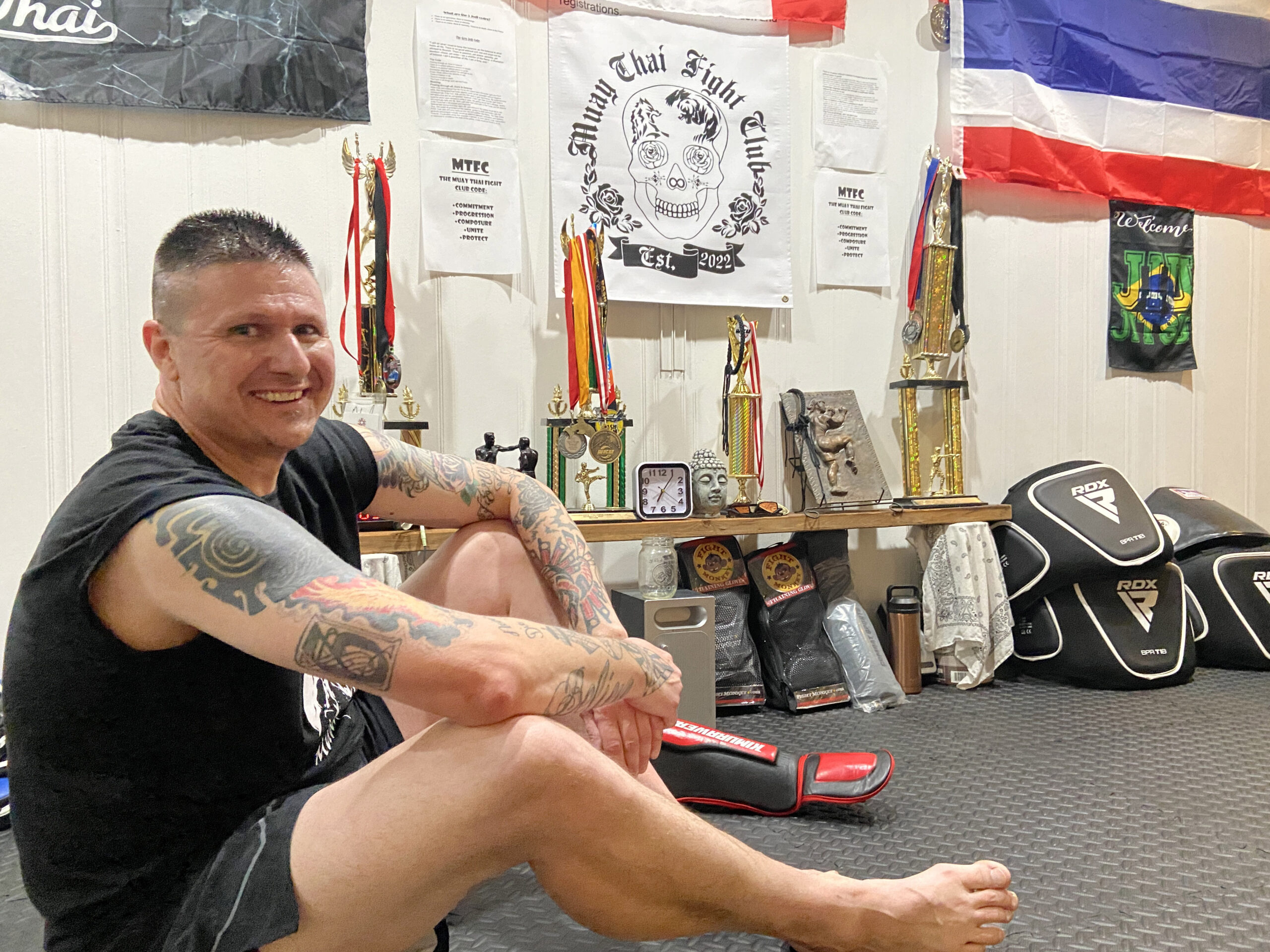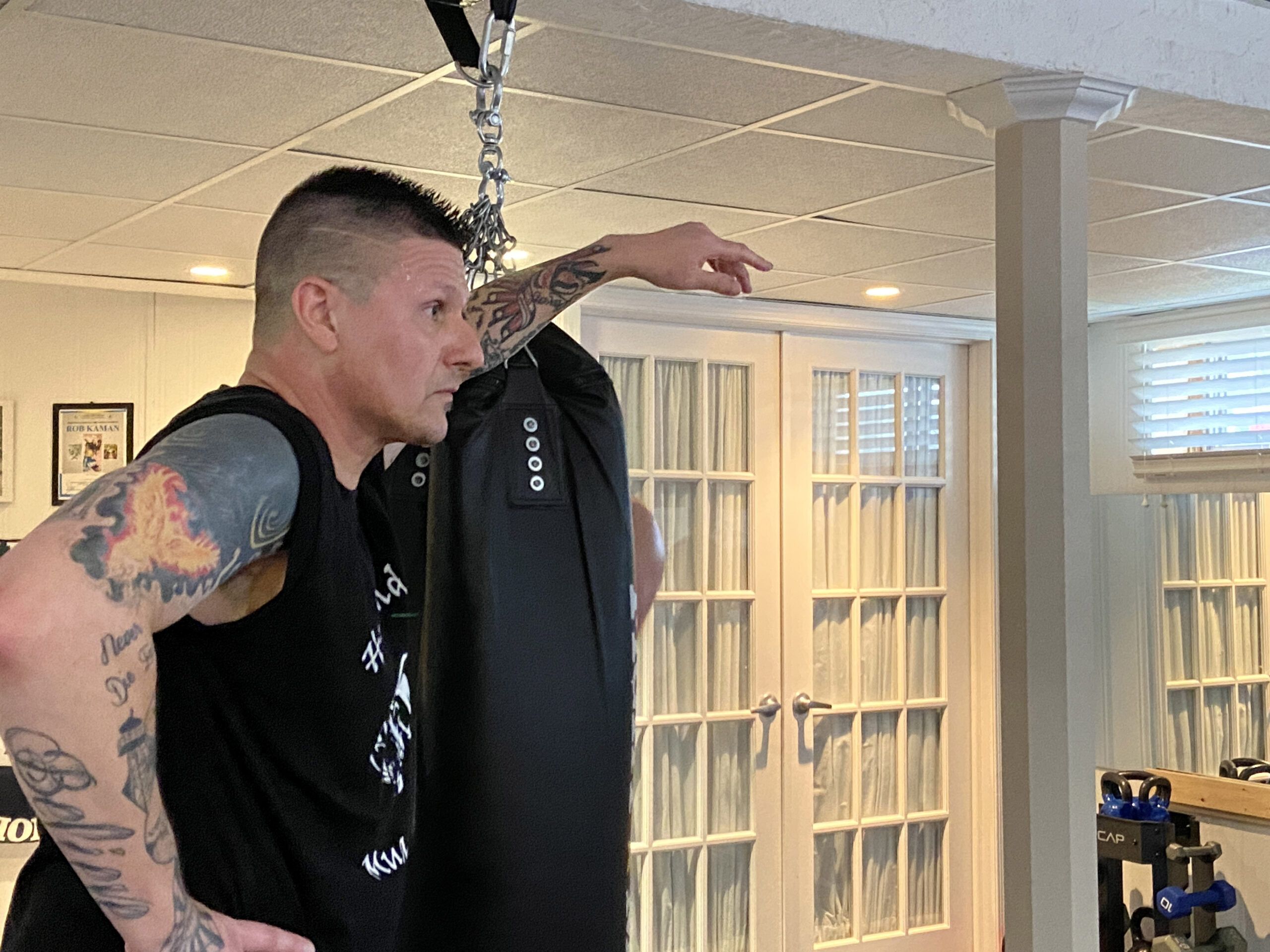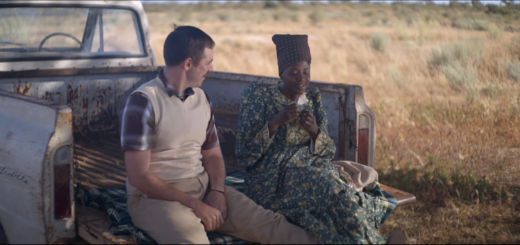Healing through Muay Thai

Muay Thai coach Lucus Greer cools down in front of his trophies after a class. Photo by Mikaela Delos Santos
By Mikaela Delos Santos, Publishing Editor
After having trained Jiu Jitsu in my own personal time, I learned that the overall MMA culture is illusively tribe-like. And the primary rule of the MMA gyms? Thou shall not step inside with another gym’s merchandise.
And that was exactly what I did coming into the local Calgary gym Muay Thai Fight Club, or MTFC. I had my bright red boxing gloves and shin pads, repping my home gym. They were the only pairs I had as getting new ones was too expensive. I was a little embarrassed having to come to the MTFC turf with my gear to be honest, expecting to be chastised for it.
But I came in through the doors and got a nice whiff of tater tots. “Sorry, we’re just finishing up dinner!” Lucus Greer greets. He was with his wife and daughters, cleaning up the table while cartoons played in the background.
Greer, 44, owns and runs the MTFC, teaching Muay Thai and self defence in the evenings. In his day job, he works as an addictions counselor. He tells me that he grew up in Ontario as a kid who felt like he didn’t belong. Greer is of Ojibwe, Mi’kmaq background. His other side of the family, as he tells me, is part colonist, a circumstance in which he says comes with its own struggles and challenges.
“I grew up in a small town of mixed race. And the racism was real. And not knowing where you belong or fit in, and kind of feeling like you don’t fit in on either side was very real.”
“Growing up, um, we were pretty broke. [I] grew up in a household that wasn’t always the nicest or most supportive. Grew up around alcoholism, drug abuse, [and] some adverse experiences. And that’s of course where I developed ADHD. And that’s where my mental health struggles first kind of started, was those situations that I just described.”
Greer struggled to perform academically in high school which led to him getting kicked out. Throughout his teenage years and early 20’s, Greer struggled with addictions.
“I almost died three times, two overdoses. And the third one I almost died in a house fire.”
He shares with me that it was in junior high when he first started smoking marijuana and drinking alcohol. For him, he found solace in these substances— an escape from home.
“Growing up in a house with an alcoholic stepfather, parents that weren’t always present, the substances, this is where you hear the term addiction. Self-medicating. Self numbing. That’s exactly what I was doing.”
“Because of my ADHD and my personality to kind of go a hundred percent in everything, I fell into addiction pretty hard and went up to stimulants, cocaine, meth, ecstasy. Those were my main ones of choice, and it took away the pain.”
He grew up closely with his grandparents, having raised him for most of his childhood. Because of this, they became a big part of his wake up call.
“I took a hit of ecstasy that was laced with down, and this was way before the issues we have now where everything is laced with fentanyl.” Down is a slang term for Fentanyl, a potent synthetic opioid.
“I passed out with a cigarette in my hand and lit myself on fire and I woke up because my arm was on fire. And I thought I had put the fire out and I went to bed and closed the door and the fire reignited. And so I woke up because I couldn’t breathe. And all I could hear was the roaring of the fire. And when I reached for the door, the smoke knocked me down. I was lucky to make it out of that alive.” Greer looked to the distance, recalling the incident. At the time, he lived in the apartment building that his grandparents owned and resided in.
“But on that one, when I realized that I had almost endangered my grandparents’ life, that was a real wake up call for me.”
Back then, Greer wasn’t aware of any resources for healthy addictions treatment. He grew up in an environment where he was taught to not talk about his struggles— he resorted to quitting cold turkey a few times which were not helpful.
It was in sports and most especially in mixed martial arts that he found a healthy means of healing.
“It reconnected me with my true self, with self-respect, self-worth. And I just threw myself into martial arts. It taught me how to love and respect myself again.”
“When I came out [to Calgary] in 2006, I was only in the city for three days before I found a martial arts place to train. I’d go to work every day in construction and work for eight hours, take two trains and a bus to get home, have something to eat, take two trains and a bus to the gym, train for two hours or however long. Take two trains and a bus back home, fall asleep, get up the next day and do it over again. So I just made myself too tired to even be able to fall back into those old ways.”

Muay Thai coach Lucus Greer has made his basement as his own Muay Thai gym, training and teaching self defence to students. Photo by Mikaela Delos Santos
After making a quick joke about my gloves, Greer led me down the basement— his territory. The whole setup reminded me of the Hart family’s ‘dungeon’, known for training the world’s most renowned wrestlers out of their basement in Southwest Calgary. I see his home like an iceberg, the upstairs defines Greer’s achievements in life— his loving family, the house he has built to become a home. It’s what we can all see. Downstairs, the gym, symbolizes Greer’s internal fighting ring where he had to train and fight for what we see now.
In realizing that, I truly felt honoured to be invited in. It was small and intimate, giving way for him to connect with his students better. I saw how his work as a counsellor and as a coach merged together— starting the training session off with asking how everyone’s day was and how they felt. One by one, he gave attention and acknowledgement to each student, all while we did our burpees and jumping jacks. Apparently, he also adds some wisdom from what he learned in his university philosophy class during warm ups. Everyone jokingly said it was a lucky day for me that I had missed it.
In 2011, Greer received his black Prajiet (Muay Thai’s equivalent to a belt in other MMA practices). He started coaching and teaching in various gyms that he was training in. To be able to help others, just as he does in his counselling now, gave him a great feeling of satisfaction.
“You’re helping people achieve their goals, whether it’s to get in better shape, to lose weight, to quit smoking, or to gain confidence [and] learn to love themselves again, you’re a part of that. And to me, that’s so much more important than creating fighters or champions.”
Overall, his current work as an addictions counsellor and as a Muay Thai coach was a driving force in his healing as a person of First Nations heritage. He tells me that it was Muay Thai that reignited his warrior spirit and became a way to reconnect with his Ojibwe and Mi’kmaq ancestry. In his counselling work, he incorporates the use of the medicine wheel, creating a specific program that integrates traditional Indigenous healing methods.
“Martial arts started the healing. It gave me a supportive community. It taught me how to coach, how to help people. It gave me the courage and the belief in myself that I could go back to school later in life and get the education I want to do the job I want. And through that belief in that journey, it connected me with my people, again, both professionally and with the people I serve.”
“It really helped me give back to native communities. It’s huge. It was so special to me.” He adds.
He also taught me during our talk that in Ojibwe culture, family is very important. From the very moment I set foot in his home, I could tell that he puts the value of family into genuine practice. During our talk, his daughters were just a few feet away from us playing with their toys. I asked him, as he watched his two girls, what he wants for them to learn from their heritage.
“I never want my kids to look at themselves as victims or that they’re any less than. And that goes for everything that’s being Indigenous. It doesn’t make you any different than anybody.”
“And not in any bad way, being female doesn’t make you weaker or [seen as] prey. Which is, you know, unfortunately that’s our society, you know? So I want them to break all of those narratives and all of those molds and be strong, brave, independent and proud.”
I asked Greer what he thought of Canada’s means of reconciling with the Indigenous peoples of Canada.
“It starts with accountability. Reconciliation is just a word without accountability. I love Canada. I’m so happy to live in Canada. I’m so proud to be from Canada. [But] Canada has a dark history when we talk about colonization, forced assimilation and what it continues to do in oppressing and marginalizing its Indigenous people. And they’re not upfront about it. The truth is not fully shown.”
“It starts to come out. We’ve seen that with the murdered children in the graves at residential schools. We need more of that, more accountability, more transparency. And again, it’s not that we want to live in a place of hate and blame, it’s just for healing to truly happen. There needs to be that acknowledgement and accountability on an individual level.”
It was getting late, and Greer had to help with his girl’s bedtime routine. Turns out, our talk had gone on for more than we scheduled. Greer had a way of talking with great passion that you’ll become enmeshed with his teachings and wisdom, and I came out leaving with a greater respect and appreciation for the Indigenous cultures and peoples of Canada.
As I packed up my gym-branded gloves leaving the MTFC turf, I couldn’t help but relate it to some of Greer’s wisdom that he imparted with me.
“Whatever term you’re gonna use, Indigenous, Aboriginal, realize that you’re talking about many peoples [and] many tribes, right? And there’s commonalities. There’s overlap and some beliefs and cultures, but they are very unique unto themselves.”
“Like Blackfoot are proud people. Cree are proud people. Ojibwe are proud people. I think the more we can connect and be one the better, personally. I don’t think we need to be so isolated, but people, nobody should forget who they are and where they come from.”
Our interaction, I thought, is what defines Canada. I was a foreigner from a different gym, stepping foot in MTFC territories. Greer welcomed me with open arms, gave his time to teach me, and sent me back on my way with a new kicking technique and deeper insight into his culture.




